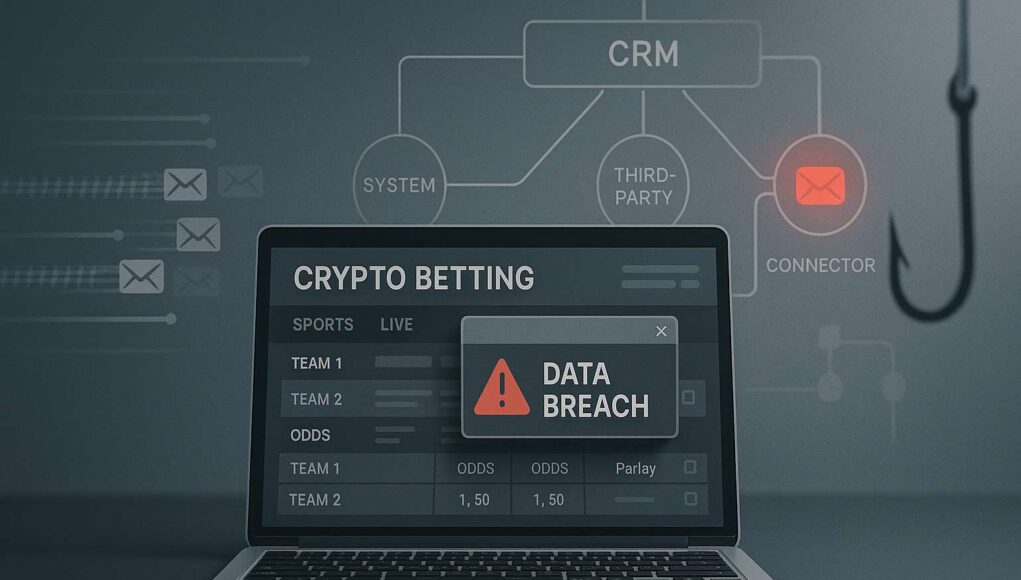A recent Shuffle.com data breach has underscored how even blockchain-based betting platforms remain vulnerable when third-party systems fail. The crypto betting platform confirmed that user data was exposed after its marketing automation partner, Fast Track, suffered a security incident. No crypto wallets or on-chain assets were affected. Still, the event has reignited concerns about user privacy and data handling in Web3 gaming.
A Breach Triggered by a Vendor Vulnerability
Shuffle.com traced the security lapse to Fast Track, a Malta-based CRM and engagement automation provider used by several iGaming operators. According to official statements, the Fast Track security breach allowed unauthorized access to customer data stored on external servers. The compromised information reportedly included email addresses, account engagement logs, and limited marketing metadata, but no private keys, wallet data, or financial balances.
Shuffle.com said an internal audit of suspicious access patterns revealed the data breach. Shuffle.com immediately suspended its integration with Fast Track, launched an independent blockchain security audit, and notified affected users.
>>> Read more: ModStealer Malware Uses Fake Job Ads to Target Crypto Wallets
What Was and Wasn’t Compromised
Initial findings confirm that the user data leak affected only off-chain records, specifically, data collected for marketing and player engagement. Shuffle.com clarified that crypto balances, deposits, and withdrawals remain fully protected under its decentralized infrastructure. The breach did not involve the platform’s core operations and smart contracts.
Users were advised that while their funds are safe, some contact data may have been exposed. The company has warned customers to remain cautious of phishing attempts imitating Shuffle.com’s official communications.
Fast Track’s Response and Containment Efforts
Fast Track confirmed the security breach on its own platform, acknowledging a “technical vulnerability in a data processing module” that affected a limited number of clients. The firm stated that they patched the flaw immediately and that they had engaged an external cybersecurity team to review their systems.
In its public note, Fast Track emphasized that it is certified under ISO 27001 and follows GDPR compliance best practices. However, it admitted that the breach’s impact extends across several iGaming brands that rely on its CRM automation tools.
Shuffle.com’s Transparency and Audit Measures
Following the incident, Shuffle.com has taken steps to rebuild user confidence. The company has paused all marketing automation campaigns, commissioned a blockchain security audit, and enhanced its GDPR compliance protocols.
A spokesperson for the company said the focus now is on “restoring trust through transparency and prevention.” This includes tightening data-sharing agreements with third-party vendors and requiring stricter encryption standards for all future integrations.
Third-Party Risk in Crypto Betting
Experts say the Shuffle.com incident reflects a broader vulnerability across the iGaming and Web3 sectors, the increasing third-party risk in iGaming. Crypto betting platforms often rely on off-chain service providers for customer analytics, marketing, and engagement automation. These external systems, while convenient, introduce points of failure that blockchain immutability alone cannot protect against.
The event highlights a recurring contradiction in decentralized industries: while user funds may remain secure on-chain, they frequently store personal data in centralized databases. For many analysts, the Fast Track security breach is a reminder that crypto gambling security must extend beyond wallets to include vendor compliance and data privacy audits.
What Users Should Do Now
Shuffle.com users are advised to remain vigilant against phishing and impersonation scams. Any email or message requesting personal credentials should be verified through official channels. Users can also enable two-factor authentication where possible and monitor accounts for abnormal activity.
While the company continues to strengthen its systems, experts encourage all crypto-gaming participants to be aware of the data privacy risks in Web3 and limit the personal information shared with third-party services whenever possible.
>>> Read more: Embargo Ransomware: BlackCat Successor Targets Healthcare
The Shuffle.com data breach is a reminder that blockchain infrastructure alone cannot guarantee complete immunity from cyber incidents. As crypto-betting platforms continue to merge decentralized finance with centralized marketing systems, human oversight and vendor accountability will remain crucial.
Ultimately, the incident reinforces a simple truth: in Web3, decentralization secures the money — but transparency secures the trust.










